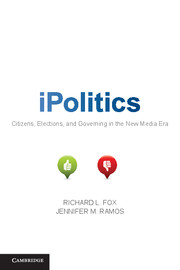Book contents
- Frontmatter
- Contents
- List of Tables and Figures
- Contributors
- Preface and Acknowledgments
- Introduction
- Section I The Shifting Media Universe and News Consumers
- 1 More Sources, Better Informed Public? New Media and Political Knowledge
- 2 Rethinking Television's Relationship to Politics in the Post-Network Era
- 3 Interplay
- Section II Campaigns and Elections in the New Media Environment
- Section III Civic Mobilization and Governance in the New Information Age
- Index
- References
2 - Rethinking Television's Relationship to Politics in the Post-Network Era
from Section I - The Shifting Media Universe and News Consumers
Published online by Cambridge University Press: 05 June 2012
- Frontmatter
- Contents
- List of Tables and Figures
- Contributors
- Preface and Acknowledgments
- Introduction
- Section I The Shifting Media Universe and News Consumers
- 1 More Sources, Better Informed Public? New Media and Political Knowledge
- 2 Rethinking Television's Relationship to Politics in the Post-Network Era
- 3 Interplay
- Section II Campaigns and Elections in the New Media Environment
- Section III Civic Mobilization and Governance in the New Information Age
- Index
- References
Summary
With the new media era upon us, scholars of political communication have turned much of their attention to the Internet's impact on politics. Yet the new media environment also comprises new ways in which the “old medium” of television has been transformed because of technological innovation and industrial reorganization. Television has gone from a stable and predictable medium, dominated by a three-network oligopoly that largely controlled or shaped most aspects of the viewing experience in the network era (1950–80), to an aggressively competitive industry comprised of multiple channels and networks in the cable era (1980–2005), to an industry greatly destabilized by viewer choice and control in the digital, post-postnetwork era (2005 to the present). As a result, practices that traditionally constituted citizens’ relationship to politics through the medium have been altered as well. While documenting the decline of television news, the discipline has largely ignored these major transformations. We have numerous books on blogging and politics, for instance, yet such behaviors are not even close to rivaling the continued importance and impact of television in citizens’ lives, where it is still the most frequently used medium for information. In short, while the medium has continued relevance to political life, political communication scholars in recent years have paid scant attention to it.
Amid such transformations, we must be careful that our working ideas and conceptions – and from that, our theories of television in relationship to American democracy – are not outdated as well. The main currents of academic and critical thought about television's role in American democracy have typically posited certain programming forms (e.g., news) as valuable to an informed citizenry and other programming forms (e.g., entertainment shows) as harmful or dangerous, largely because entertainment television is seen as a distraction from the more important business of participation in American civic life, while news is seen as enhancing or encouraging it (Putnam 2000). Because of economic competition and technological innovation, television has changed, including at the level of what constitutes its programming and how it is attended to by viewers. The economics of news production in an intensely competitive environment, for instance, has had enormous consequences for the composition of news and how it appeals to viewers (McManus 1994). The need for inexpensive programming in a vastly increased news hole (twenty-four hours of news) has led to emphasizing program stylistics and the elevation of talk and opinion over traditional reporting. In addition, the competitive environment has led news channels to focus on the creation of niche audience markets, including tailoring news to ideological and partisan concerns. News, then, is about assembling a dedicated viewership (or community) whose loyalties and passions are encouraged by certain performances of public affairs.
- Type
- Chapter
- Information
- iPoliticsCitizens, Elections, and Governing in the New Media Era, pp. 48 - 75Publisher: Cambridge University PressPrint publication year: 2011
References
- 1
- Cited by

